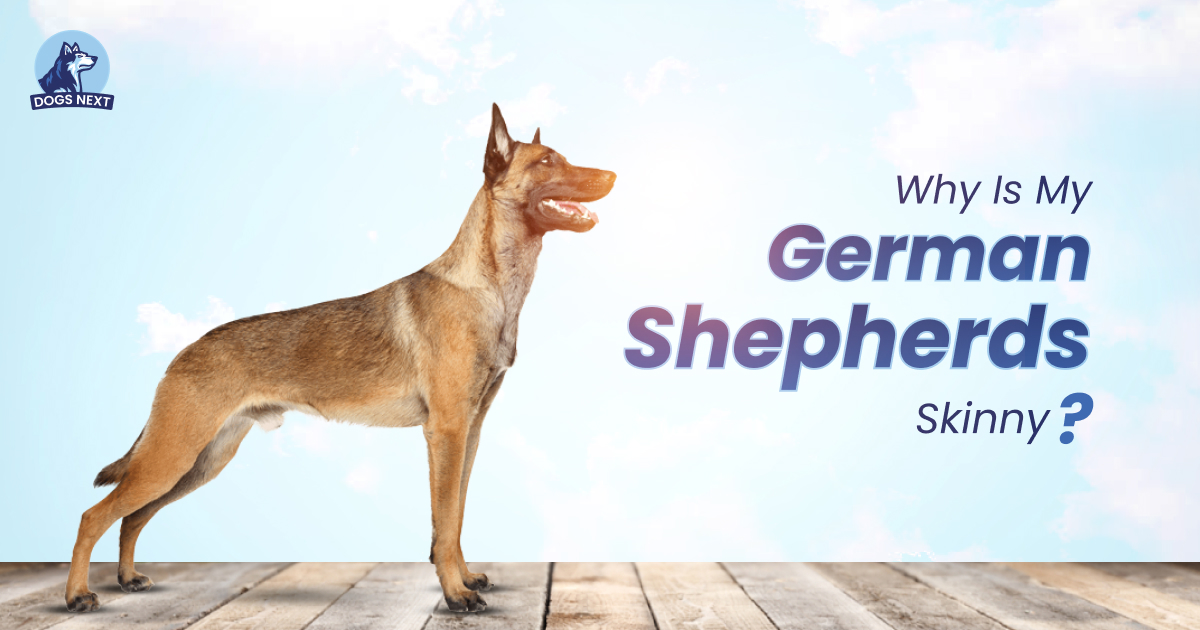There could be various reasons why your German Shepherd is skinny. The most common reasons include an inadequate diet, medical conditions, and insufficient exercise. It’s essential to identify the underlying cause of your dog’s weight loss and work with a veterinarian to develop an appropriate treatment plan. Your veterinarian can conduct diagnostic tests to determine if there are any underlying medical issues causing weight loss.
If the cause is dietary, ensure you are feeding them high-quality dog food appropriate for their size, age, and activity level. Increasing the frequency of meals, offering high-calorie treats, and monitoring their weight can help them gain weight.
Regular exercise is also crucial for their overall health, and it can stimulate their appetite. It will take quite a lot of time for me to cover all the necessary information in this article, but I will try my best to do so.
Table of Contents
Why Is Your German Shepherd Skinny/Losing Weight?
Taking your German shepherd to the vet to make sure everything is okay should be your first step if you think they are becoming too thin, or losing weight.
Although you do not need to worry too much about your German shepherd being skinnier than normal, there are lots of different reasons why he might be much skinnier than he should be.
- Genes
- Poor Diet
- Senior Dogs
- Exercise
- Illness
- Anxiety
- They Don’t Like the Food
- Disruption in their Environment
- Parasites
- Dental Problems
- Diabetes
- Liver Disease
- Cancer
Genetics: Genetics can play a role in a dog’s body condition and weight, just like it can for humans. Some dogs may naturally be leaner or have a higher metabolism, which can make it more challenging for them to maintain a healthy weight. However, even if genetics are a factor, it’s still important to provide your dog with proper nutrition and exercise to support their overall health and well-being.
Inadequate or imbalanced nutrition: A poor diet that is low in quality or doesn’t provide the necessary nutrients can contribute to weight loss in dogs. It’s important to feed your German Shepherd a balanced diet that includes high-quality protein, healthy fats, and carbohydrates. Consult with a veterinarian or animal nutritionist to determine the best diet for your dog’s individual needs.
Senior dogs: As dogs age, their metabolism slows down and they may have difficulty maintaining weight. Senior dogs may also have other health issues that impact their appetite or ability to absorb nutrients, such as dental problems or digestive issues. It’s important to monitor your senior dog’s weight and consult with a veterinarian if you notice any changes.
Over-exercising or lack of physical activity: While exercise is important for your German Shepherd’s health, too much exercise can lead to weight loss and a too-skinny appearance. Make sure that you are not over-exercising your dog and that they are getting enough rest and recovery time.
Underlying medical condition: Some illnesses, such as thyroid problems or cancer, can cause weight loss in dogs. If you are concerned about your dog’s weight loss, it’s important to consult with a veterinarian to rule out any underlying medical issues.
Stress or behavioral issues: Stress and anxiety can also cause weight loss in dogs, including separation anxiety or changes in routine or environment. If you suspect that stress may be causing your dog’s weight loss, it’s important to identify and address the underlying cause.
They don’t like the food: Just like humans, some dogs may not like certain foods. If your dog is not eating enough or is refusing to eat their food, try offering different types of food or consulting with a veterinarian or animal nutritionist to find a more appealing diet.
Disruption in their environment: Changes in routine or environment can cause stress and anxiety in dogs, which can lead to weight loss. Try to maintain a consistent routine for your dog and provide them with a comfortable and familiar environment to reduce stress.
Internal or external parasites: Parasites such as worms or fleas can impact a dog’s ability to eat and digest food properly, which can lead to weight loss. Regular parasite prevention and treatment can help prevent this issue.
Dental problems: Dental issues such as broken or infected teeth can make it difficult or painful for a dog to eat, which can lead to weight loss. Regular dental care and check-ups can help prevent or address these issues.
Diabetes: Diabetes can cause weight loss in dogs due to changes in metabolism and insulin regulation. If you suspect that your dog may have diabetes, it’s important to consult with a veterinarian for proper diagnosis and treatment.
Liver disease: Liver disease can also impact a dog’s metabolism and ability to absorb nutrients, which can lead to weight loss. If you suspect that your dog may have liver disease, it’s important to consult with a veterinarian for proper diagnosis and treatment.
Cancer: Cancer can cause weight loss in dogs due to changes in metabolism and nutrient absorption, as well as cancer-related appetite changes. If you suspect that your dog may have cancer, it’s important to consult with a veterinarian for proper diagnosis and treatment.
The pickiest eaters are: The food you serve your German Shepherd might not be to its liking, so he won’t eat. In this case, a dog is less interested in plain dog food because it is used to eating table scraps or treats.
What to Look For in a Too-Skinny German Shepherd
There are several signs that can indicate if your German Shepherd is too skinny. Here are a few things to look out for:
- Visible ribs and spine: One of the most obvious signs of an underweight German Shepherd is the visible ribs and spine. You should be able to feel the ribs when you run your hands along their sides, but they should not be protruding.
- Lack of muscle mass: A healthy German Shepherd should have well-defined muscles, particularly around their hips and shoulders. If your dog appears bony or emaciated, it may be lacking muscle mass due to insufficient nutrition or exercise.
- Weakness or lethargy: If your dog is too skinny, it may lack the energy to engage in its usual activities. They may appear weak or lethargic, and their stamina may be reduced.
- Poor coat condition: An underweight German Shepherd may have a dull, lackluster coat due to inadequate nutrition. Their coat may also be thin or patchy in some areas.
- No Waist: When you look at your German Shepherd from above, it should have a noticeable waistline. If their body appears straight from their shoulders to their hips, they may be too thin.
- Increased susceptibility to illness: An underweight dog is more susceptible to illness and infections, as their immune system is weakened. If your German Shepherd is frequently ill or seems to take longer to recover from illness or injury, they may be too skinny.
If you notice any of these signs, it’s crucial to consult with your veterinarian to determine the cause of your dog’s weight loss and develop an appropriate treatment plan.
Can a German Shepherd be fattened up?
You can’t simply add two times as much food to your dog’s bowl and get them to gain weight. Ensure that they do not become overweight as well.
In addition to a balanced diet, your German Shepherd should also follow a variety of exercises.
They may purchase food that is completely different from what they’re used to.
Adding some more edibles to their diet might be an easier way to make a change. No matter which strategy you choose, keep trying different ones until you land on what works.
Give Your German Shepherd an Extra Meal
There is no need for you to feed your German Shepherd more than twice daily. Please begin if you have not already done so. Ensure that the appropriate amount of weight is gained by this method.
The food plan you are currently feeding your German Shepherds should be increased to three times per day if you are already feeding them twice a day.
The meals should be distributed evenly between the day and a similar amount of consumables should be available at each meal.
In the morning, evening, and right before they go to sleep, give your German Shepherd 2.5-3.5 cups of kibble.
German Shepherds can eat whenever they want
It is not the case that all dogs become hungry at the same time every day. Their mealtime might vary from day to day, so one day they may eat at their regular time, and another day they may skip it.
This is why it’s important to make sure that your German Shepherd is always provided with food if you want it to be happy.
If you leave wet food out too long, it will spoil. Only do this with dry food. Your German Shepherd should be monitored to see whether he is eating more or less.
There are many circumstances in which a child might not be eating as much, such as the excitement they experience when they see a full plate at set times, which leads them to overeat.
More treats are good for your German Shepherd
Keep your companion occupied between meals by providing more goodies. It is a good idea to give them a few more treats if they usually get one or two a day. As with meals, make sure they are spread out.
Make your treats yourself if you wish. Your German Shepherd will know exactly what extra food to give you if it gives you those puppy eyes whenever you eat chicken.
As well as fruit, peanut butter, and apple slices are also great snacks to enjoy.
Puppy food for adult German shepherds
Your companion is still underweight, even if you feed her a nutritious diet. Whenever you feed your puppy chow, remember to mix in puppy food as well. Feeding them only puppy food isn’t the best thing you can do for them.
To be sure that this method is safe for your German Shepherd, make sure that you talk to your veterinarian before you try it out. You can feed half adult mix and half puppy chow to your companion if they give you permission to do so.
Your German Shepherd will gain weight at a faster rate when you use this method.
Calorie-dense dog food should be purchased
Make sure the dog food you are feeding has the right amount of calories. It is best to choose something that contains a noticeable amount of protein and fat. Food should be healthy, so keep that in mind.
The best German Shepherd dog food for weight gain is listed below.
You should be careful when buying dog food that contains fillers. It is possible for them to work if they are done properly.
In the wrong hands, they could cause weight gain or high blood sugar in your German Shepherd.
Frequently Asked Questions
Q: Why do German Shepherds lose weight?
Ans: Exocrine pancreatic insufficiency is a disorder that causes GSDs to have too few enzymes. The dog’s inability to absorb food fat causes a dry and flaky coat due to inadequate digestion and absorption of nutrients.
Q: Even though my dog eats, he gets skinny?
Ans: Dogs lose weight when they are calorie deficient. It may be due to a lack of food quality, a high energy demand, or a health issue. Diabetes, intestinal parasites, dental problems, and cancer can all cause sudden weight loss.
Q: How can German Shepherds gain weight with the best food?
Ans: Sheep with problems gaining weight will benefit from consuming lean protein of high quality. You should avoid meats high in fat, such as lamb, duck, and goose. It is ideal to consume lean meat with no more than 8% fat.
Conclusion
In conclusion, there are various reasons why a German Shepherd may be skinny, and it’s essential to identify the underlying cause to address the issue effectively. Some common reasons may include improper diet, underlying health issues such as parasites, thyroid problems, or cancer, and insufficient exercise or stimulation.
Therefore, it’s essential to work closely with a veterinarian to conduct a thorough examination and determine the underlying cause of your German Shepherd’s skinny appearance. With the appropriate treatment, diet, and exercise regimen, you can help your German Shepherd maintain a healthy weight and live a happy, active life.

I’m David, an expert contributor and writer, with two furry friends of my own, I know the challenges of raising and caring for dogs. From training to nutrition and health, my goal is to provide valuable insights and advice to help create strong bonds and happy, healthy lives. Find me in Twitter.




